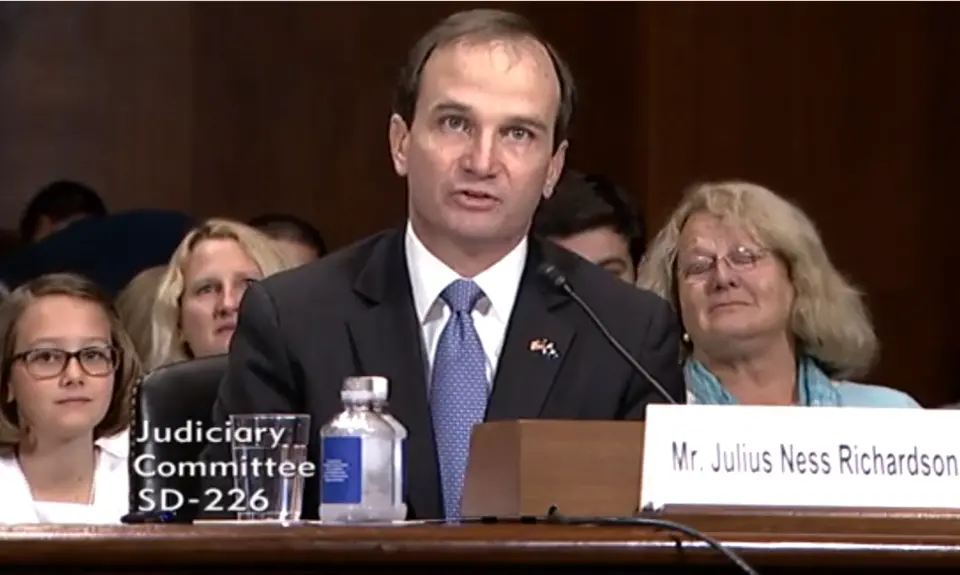“Our Courts, Our Fight” is a blog series documenting the harmful impact of President Trump’s judges on Americans’ rights and liberties and the need for the Senate to confirm President Biden’s federal court nominees to help counteract these effects . Supreme and appellate court cases in the series can be found by issue and by judge at this link.
Even though the case did not directly present the issue, Trump Fourth Circuit judge Julius Richardson reached out and ruled that the federal Age Discrimination in Employment Act (ADEA) does not prevent federal agencies from adopting policies and practices that have a discriminatory effect on older workers, dismissing an ADEA claim by a 67 year-old woman. The November 2021 decision was in DiCocco v Garland.
Dr. Jane DiCocco accepted a position as a psychiatrist for the federal Bureau of Prisons (BOP) in 2014, when she was 67. As a condition of her employment, she was required to take and pass a physical abilities test that applied to all BOP employees. The test required that she “drag a seventy-five pound dummy” almost 700 feet in three minutes, “climb a ladder to retrieve an object within seven seconds,” then “complete an obstacle course” in just under a minute, “run a quarter mile and handcuff someone” in just over two and one-half minutes, and “climb three flights of stairs in forty-five seconds while wearing a twenty-pound weight belt.”
Dr. DiCocco was not able to pass the demanding test and thus had to resign her position at BOP. After pursuing administrative remedies, she filed a suit in federal court, contending that the test had an unjustified discriminatory impact on her based on age under the ADEA and on gender based on Title VII. The district court dismissed her complaint without discovery, maintaining that she did not have standing because the facts in her complaint did not constitute an “adverse employment action” under either statute. She appealed to the Fourth Circuit.
All three judges who heard the case agreed that the lower court was wrong on the standing issue. They also agreed that the Title VII claim should be reconsidered by the district court. But Trump judge Richardson wrote a 2-1 ruling that went further and dismissed Dr. DiCocco’s ADEA claims on a different ground, maintaining that federal agencies cannot be sued under the ADEA for adopting policies and practices that have an unjustified disparate impact based on age where there is no intent to discriminate. Even though the courts have clearly held that the ADEA prohibits practices by private employers that have such an unjustified discriminatory effect based on age (which not even Richardson disputed), and even though the law requires that “[a]ll personnel action” by federal agencies “shall be made free from any discrimination based on age,” Richardson claimed that discriminatory impact cases cannot be brought under the ADEA against federal agencies. This was because, Richardson argued, the prohibition on “any discrimination” properly means “free from any amount of discrimination” not “free from any type of discrimination,” and thus does not apply to any type of discrimination other than the “plain meaning” of “differential treatment” of individual employees because of age.
Judge Henry Floyd strongly dissented. He explained that Richardson’s interpretation of the ADEA language had a “fatal flaw” – when “any discrimination” is construed to forbid suits based on practices that have a discriminatory impact like the BOP test, then “any” imposes “a ‘restriction’ rather than” what its plain meaning indicates: “‘without restriction.’” There was no basis, Floyd continued, for Richardson’s claim that the “plain meaning” of discrimination refers only to differential treatment rather than disparate impact. On the contrary, Floyd wrote, Richardson’s view contradicts “our sister circuits” and “our prior precedent,” which make clear that “disparate-impact claims” like DiCocco’s can properly be brought against federal agencies under the ADEA as well as Title VII. The text, “history, purpose, structure” and comparison with other fair employment laws “compels the conclusion,” Floyd wrote, that the ADEA prohibits federal agencies from using employment practices that are “fair in form, but discriminatory in operation,” and Dr. DiCocco should have had the opportunity to prove her ADEA claims in the court below.
The impact of Trump judge Richardson’s decision, however, goes much further. As Judge Floyd wrote, the ruling “officially sanctions the federal government’s ability to utilize employment policies and practices that adversely impact older workers,” at least in the Fourth Circuit. This case is another example of the importance, as part of our fight for our courts, of the Senate confirming fair-minded judges who can counteract the votes of Trump judges and properly interpret the ADEA and other anti-discrimination laws to protect all workers.
